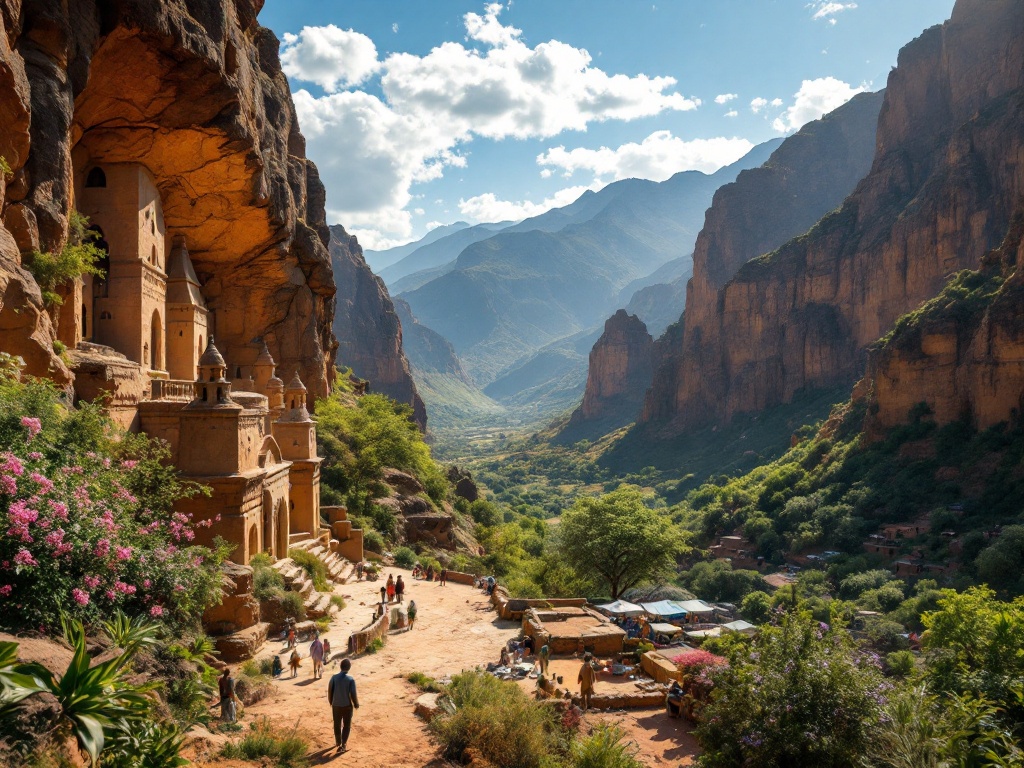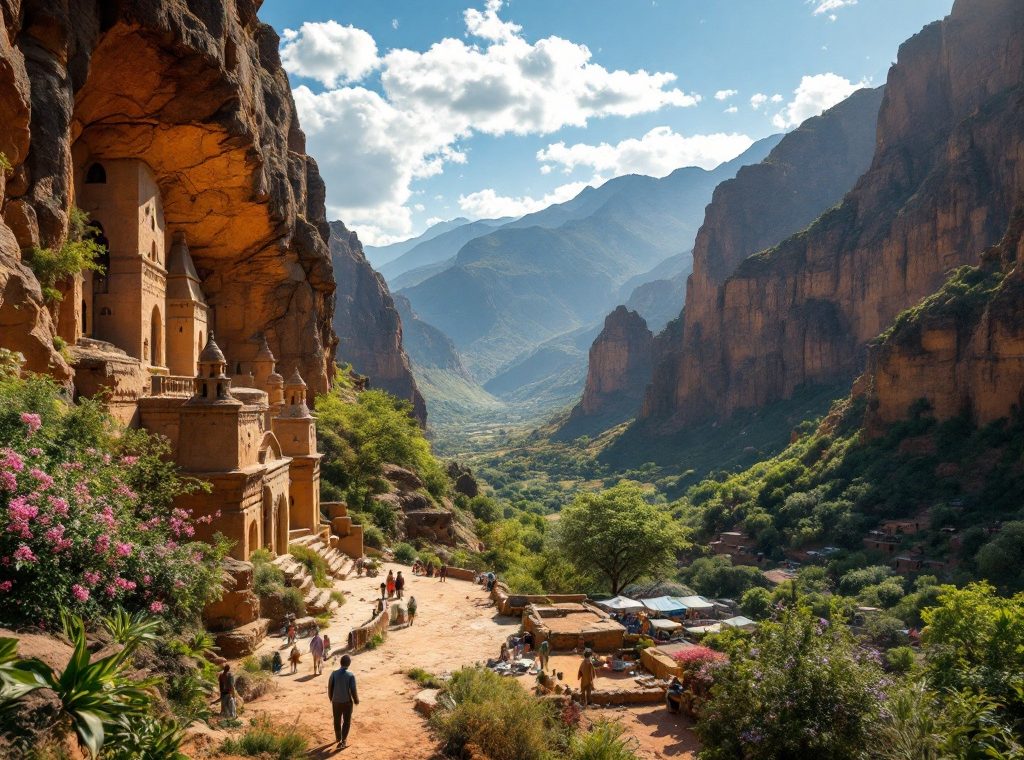Traveling to Ethiopia from the US: A Complete Guide
Dreaming of exploring ancient wonders and breathtaking landscapes? Ethiopia awaits, offering a journey through rich history and vibrant culture. U.S. citizens can easily obtain a visa online or on arrival, but ensure your passport is valid for six months beyond your trip. Prepare for your adventure with essential vaccinations, like yellow fever and typhoid, and discuss malaria prevention with your doctor. Discover safe travel tips and diverse accommodation options, from budget-friendly hostels to luxury hotels. Explore Ethiopia’s wonders, from the rock-hewn churches of Lalibela to the Simien Mountains, and immerse yourself in a unique cultural experience. Ready to embark on an unforgettable journey? Read on to plan your Ethiopian adventure!
Important information

- U.S. citizens need a visa, obtainable online (e-Visa) or on arrival at certain entry points. Your passport must be valid for six months beyond your planned departure.
- Recommended vaccinations include Hepatitis A, Hepatitis B, typhoid, and yellow fever. Discuss malaria prevention with your doctor, as it’s a risk in some areas.
- Private transport is often safer than public options. Be mindful of petty theft, especially in crowded areas.
- Ethiopia offers diverse accommodations, from budget-friendly hostels to luxury hotels. The dry season (October to May) is ideal for sightseeing.
- Explore historical sites like Lalibela and Axum, and experience the unique culinary tradition of sharing injera and wot.
Visa and Entry Requirements for U.S. Citizens
Planning a trip to Ethiopia? US citizens require a visa, easily obtainable online through the e-Visa portal. Alternatively, visas are available upon arrival at select airports and border crossings. Your passport’s validity must extend six months beyond your departure date. You might also need proof of onward travel, such as a return ticket. eVisa Ethiopia is required for most nationalities entering Ethiopia. You can learn more and apply for your eVisa at eVisa Ethiopia.
How to Obtain a Visa for Ethiopia
Getting an Ethiopian visa is straightforward for US citizens. You can apply online via the e-Visa portal or obtain one upon arrival at Addis Ababa’s Bole International Airport (ADD). Ensure your passport has at least six months of validity remaining. Alternatively, Ethiopian embassies and consulates also issue visas.
Importance of Carrying an e-Visa
Before traveling to Ethiopia, print a copy of your e-Visa. This will speed up immigration processing and protect you from potential technical issues. A physical copy ensures a smooth entry, even if electronic records are inaccessible.
Health Precautions and Vaccinations for Ethiopia
Consult your doctor or the Centers for Disease Control and Prevention (CDC) for personalized advice based on your health status and travel plans. For travel to Ethiopia, recommended vaccinations include hepatitis A, hepatitis B, typhoid, and yellow fever. If you plan to visit rural areas or travel during the rainy season, additional vaccinations might be necessary. Malaria is a risk in certain regions, so discuss prevention with your doctor. Ensure all your routine vaccinations are up to date.
Recommended Vaccinations for Travelers
Planning your trip to Ethiopia? Consult your doctor 4-6 weeks before departure to discuss necessary vaccinations. They can provide personalized recommendations based on your itinerary and health. Common suggestions include vaccines for hepatitis A and B, typhoid, and yellow fever. Because malaria is a risk in certain areas, your doctor may also prescribe antimalarial medication. Ensure your routine immunizations are current, including measles, mumps, rubella (MMR), tetanus, diphtheria, and pertussis (Tdap), for optimal protection.
Malaria and Other Health Risks
Planning a trip to Ethiopia? Be aware of malaria and other health risks. Consult a travel medicine specialist or your doctor for recommended precautions. If you develop a fever after returning, seek immediate medical attention, as it could be a sign of malaria. Enjoy your travels and stay safe!
Safety Tips for Traveling in Ethiopia
Getting Around Ethiopia:Ethiopia offers a variety of transportation options to suit your travel style. For covering long distances quickly, domestic flights are a practical choice. Buses provide convenient connections between cities and towns, while taxis and ride-sharing services are readily available for shorter trips within urban areas. If you prefer a more personalized and comfortable journey, consider hiring a car and driver. However, it’s essential to plan your routes in advance and be prepared for varying road conditions.Staying Safe in Ethiopia:Ethiopia is generally a safe country for tourists, but staying informed about local conditions is always a good idea. Keep up-to-date with local news and pay attention to any advisories issued by local authorities. Be aware of the possibility of petty theft, especially in crowded areas. By remaining vigilant and taking necessary precautions, you can have a safe and enjoyable travel experience in Ethiopia.
Public Transportation and Road Conditions
While public transportation is available in Ethiopia, renting a private car from a trusted company provides a safer and more secure travel experience.
Crime and Security Concerns in Addis Ababa
Stay vigilant against pickpocketing and bag snatching, especially in crowded areas and on public transport. Be aware of tourist scams and exercise caution at ATMs. Avoid displaying large sums of money. At night, stick to well-lit and populated streets. Utilize your hotel safe for valuables. Report any crime to the local police immediately.
Travel Logistics and Accommodation in Ethiopia
Traveling within Ethiopia offers diverse options. For longer journeys, domestic flights with Ethiopian Airlines connect major cities and tourist spots efficiently. Shorter trips can be easily made using affordable buses and minibuses. Within cities, taxis and ride-sharing services like Feres are readily available. For a more personalized experience, consider hiring a private driver or guide.
Accommodation
Ethiopia offers a range of accommodation options to suit all budgets, from budget-friendly hostels and guesthouses to upscale international hotel chains and charming boutique hotels, especially in Addis Ababa and Gondar. Eco-lodges provide a sustainable stay, particularly for those exploring Ethiopia’s beautiful natural landscapes.
Climate
Ethiopia’s climate has two main seasons: dry and rainy. The dry season, from October to May, offers pleasant weather perfect for outdoor activities and sightseeing. The rainy season (June to September) can occasionally disrupt travel, but it transforms the landscape into a vibrant, green paradise. The shoulder seasons (April-May and September-October) offer a balance of good weather and fewer crowds.
Transportation Options: Domestic Flights and Private Transport
Traveling across Ethiopia? Consider these travel options:
Flights
For longer journeys, consider domestic flights with Ethiopian Airlines, which services numerous routes within the country.
Ground Transportation
For shorter distances, private transport offers enhanced safety and convenience. Hiring a car and driver is a good option. Alternatively, buses and taxis are readily available, but research road conditions and prioritize safety.
Accommodation Choices: Budget and Luxury
Ethiopia offers a range of accommodations for budget-conscious travelers.
Budget-Friendly Stays
Hostels and guesthouses are your go-to for affordable lodging. These options, particularly in Addis Ababa, Gondar, and Lalibela, typically cost between $5 and $20 per night.
Mid-Range Comfort
For added comfort and amenities like Wi-Fi and breakfast, consider mid-range local hotels and international chains. These generally range from $25 to $75 per night, with some even offering swimming pools.
Luxury Escapes
Luxury seekers can find high-end hotels and resorts in Addis Ababa, complete with spas, fine dining, and premium services. Prices for these luxurious stays start at $100 per night.
Best Time to Visit: Dry and Rainy Seasons
Dry Season (October to May)
experience ethiopia’s dry season, from october to may. this period offers comfortable temperatures and abundant sunshine, creating the perfect conditions for hiking and sightseeing.
Rainy Season (June to September)
the rainy season, from june to september, unveils a different side of ethiopia. the landscape transforms into a lush green paradise, offering a unique perspective. however, be prepared for potential travel challenges due to road conditions.
Cultural and Historical Attractions in Ethiopia
Explore Ethiopia’s rich history and vibrant culture. Marvel at the rock-hewn churches of Lalibela, a UNESCO World Heritage site. Journey to the ancient city of Axum, home to towering obelisks and royal tombs. Discover Gondar’s impressive castles, offering a glimpse into Ethiopia’s imperial past. Ethiopia’s natural beauty also beckons. Hike amidst the breathtaking landscapes of the Simien Mountains National Park. Witness the unique geological formations of the Danakil Depression. Explore the museums and cultural treasures of Addis Ababa, the nation’s capital, to further delve into Ethiopia’s captivating past.
Historical Sites and Tourist Attractions
Discover Ethiopia, a land of captivating contrasts. Explore the rock-hewn churches of Lalibela, a UNESCO World Heritage site. Journey to the ancient city of Axum and witness its towering obelisks and royal tombs. Trek through the breathtaking Simien Mountains National Park. Explore the unique geological formations of the Danakil Depression. Immerse yourself in the vibrant culture of Addis Ababa, visiting its museums and cultural sites. Venture into the Omo Valley and encounter the rich traditions of diverse tribes. Experience an unforgettable journey through Ethiopia.
Experiencing Ethiopian Cuisine and Coffee
Ethiopian cuisine offers a unique culinary adventure, emphasizing bold flavors and shared dining experiences. Central to this is injera, a sourdough flatbread serving as both plate and utensil. Imagine this delicious edible sponge soaking up rich stews, known as “wot.” These wots range from doro wot, a flavorful chicken stew, to shiro wot, a popular chickpea-based option. Served on a large communal platter, everyone shares the meal, scooping up the wot with pieces of injera. Beyond the food itself, the traditional Ethiopian coffee ceremony is a must-try. It offers a glimpse into their vibrant culture and hospitality. It’s more than just a meal; it’s a true cultural immersion.
















